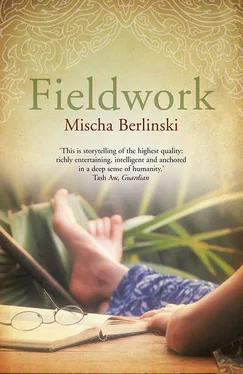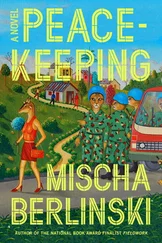In this way, Martiya severed her last connection to Berkeley and returned to Dan Loi. Just one week after her return, she turned forty.
Back in Asia, Martiya complained to Gilles that her cottage was smaller than she had recalled, and darker. She told Gilles that the hut, which she had once considered cozy, now seemed as tight as a coffin. Gilles remembered visiting her and being startled by the manic energy with which she burst out of the bedroom and into the study. The hut wasn't small, Gilles said: it was almost as large as the sala of his house. What's more, it opened up onto a spectacular vista: just beyond the threshold of the hut was her large patio, beyond that all the village, and beyond that the huge dip of the valley, those foothills which if followed would lead to Burma, to China, and to the highest mountains in the world. Now Martiya complained that there was no place for her here: she was tripping over her books, her desk, her chair. The chimney smelled. She could not even turn around.
The sensation of claustrophobia continued even beyond the tight confines of her hut. It had been twelve years now since she had first set foot in the village, and, disciplined as ever, she continued in her routine: she pursued her longitudinal studies of village life, visiting every day with village families, continuing to observe the panoply of Dyalo rites, attending law cases. Yet even in the rice fields, where she stood with the shaman George Washington, chasing out the jungle spirits who threatened Rice, with nothing around her in any direction at all but open mountain air, she felt trapped — the same sensation of panic, and nervous sweat, and nausea rising up in her as she felt in her study.
Martiya told Gilles that she had not realized how much her father's presence in that house on Etna Street had offered her. She had never said to herself, "I have moved to a small Dyalo village in northern Thailand where I will stay forever." She had always said to herself, "I am doing fieldwork, extensive fieldwork, in Dan Loi, and when I am ready I will leave." To leave meant to return to her father's home, to Berkeley, there to begin again. Now contemplating her life, she asked herself, "Where would I go?" That she had no answer terrified her.
Gilles remonstrated with her when she complained. "A woman of your intelligence, of your abilities, has options, Martiya. You do not have to stay in that village. You could finish your doctoral thesis in two months and become a professor. It is still possible. We could go to France. The world is so big, and you're still young."
But Martiya didn't listen. Did Gilles understand what it meant to be alone in the world? She had no family at all but some vague relatives of her father's in Holland. She was forty years old. She had been in the village more or less since the age of twenty-seven. She had no skills, knew nothing of the world really but this little village. Martiya's normally bright face was now habitually drawn and gloomy. She complained that her attempt to see the native's point of view was a failure. She could not escape herself. She understood nothing of these people, and what's more, her sustaining curiosity had failed her: what she did not understand, she no longer cared to understand. She had no place to go.
At the onset of the rainy season of 1987, almost precisely a year after Piers's death, Gilles had dinner with Martiya in Dan Loi. He was about to leave for his annual visit to France. She was, he said, calm, and had proposed that the two of them take a vacation together when he came back. This was a breakthrough, Gilles thought, the first sign of progress in almost a year. Neither Gilles nor Martiya said it, but it was understood by both that this vacation would be the first step in constructing a new life together, away from Dan Loi.
"Do you want to go now?" he asked.
Martiya said no. "I want to see the rice planting," she said. The rice planting was one of Martiya's favorite moments in the Dyalo calendar. That night they had a bottle of wine, and Gilles noted the occasion in his wine log.
That bottle of wine, a Côtes du Rhône, proved the last that Martiya and Gilles would share.
Two of the cats began to fight over an anchovy, hissing at one another. "Il y en a assez pour tout le monde," Gilles said. "Ça suffit."
Gilles went back to France, and spent a month, as usual, with his parents and son. Usually when he was away, he and Martiya would exchange a few letters, and Martiya, when she was in Chiang Mai or elsewhere, would call him; Gilles couldn't call Martiya, after all, in the village. But this year, Gilles heard from Martiya only once: about two weeks before he was to return, she called him in the middle of the night, awakening him and his family. When Martiya realized the hour at which she called, she excused herself and said that she would call the next day. She didn't, and Gilles had no way of reaching her. Her voice had been agitated, and Gilles was worried.
"Why, exactly?" I asked.
Gilles hesitated, then said, "I thought she might be with another man."
Gilles decided to cut his trip back by a week. Although he could not call Martiya, there was a telephone at the café where she usually read her mail, and he left a message for her there that he was returning. He told her to meet him at the airport. But when he arrived at Chiang Mai, there was no sign of her. The next morning, Gilles went up to Dan Loi.
The monsoon had broken that year with unusual force, and the road to Dan Loi had been washed out. Several kilometers from the village Gilles was forced to abandon his motorbike and hike into the village on foot. He arrived just as the evening sky was turning black. The great bowl of the valley spread out from Martiya's front porch like the pit of an exhausted mine. Martiya looked up at Gilles as he entered the hut, and for a long terrible moment didn't seem to recognize him.
"Gilles," she said. "I should have — I'm sorry …"
Gilles had never seen her this way before. She began to tremble. Gilles went to her but the look in her eyes stopped him. She breathed deeply and calmed herself. She offered Gilles a seat and, seeing his soaked clothes, began to make tea. She lit the small gas burner with a match, poured water into her old kettle, and placed it on the blue flame. When the two were settled with mugs in their hands, she looked at Gilles, then swung her eyes away from him. Her moment of composure was gone, and she began to tremble again.
"What's happened?" Gilles said. "What's the matter?"
Martiya said nothing. A moment passed, then a minute.
Martiya broke the silence. She told Gilles that it wasn't his fault, but that there was another man.
"I had no idea that I could be so angry," Gilles said. The declaration contrasted with his calm face, his tone of voice, and the tins of tuna. "But I looked at her, and it was like being angry with one of them ."
He gestured at the cats.
"You know what she said to me?"
I shook my head.
"She told me that the headman of Wild Pig village came to her hut. She said that she made dyal . She told me that she had made rice. She told me that she had gone into the headman's fields and made rice. I said, ‘And?' And she said, ‘Isn't that enough?' "
Gilles was silent for a long while. An adolescent monk strolled past us and nodded at Gilles, who nodded back.
"It wasn't what she was saying. It was her eyes," Gilles said.
"What was it about her eyes?"
"That evening in Martiya's hut was the strangest moment in all my life. Because I knew that woman, I knew her very well. But I don't know if she recognized me at all. There is only one word I can use to describe her eyes. Possédés ."
Gilles went back to France a few months after he last saw Martiya. He wrote to her, asking her to get in touch with him should she need anything. Otherwise, he promised, she would not hear from him again; and, he wrote, he hoped she would leave him alone as well. He heard nothing from her, and Gilles, who had learned from the bambou to bend in a hard wind and not break, was sufficiently a man of the world to interpret her silence appropriately.
Читать дальше












